YK Pao High School’s Chinese Department has always taught Chinese poetry in a distinctive manner. The teachers hope that during their high school years, students can familiarize themselves with poetry appreciation, criticism, and creation, such that they can fully experience poetry’s many charms. The teachers are especially pleased to discover the students’ poetic prowess is even greater than they had imagined.
The changing of the seasons is a timeless poetic theme and one that YK Pao School’s high school students are exploring in their poetry studies. The students’ poems about spring, summer, autumn, and winter have been collected in respective volumes, with the third volume “Poetry for Winter” gathering the works of high school students in their third and fourth year. The following article features a selection of poems about winter.
——Le Yingyu,
Head of High School Chinese
The creative process for the works in “Poetry for Winter” was quite open. Students are not required to adhere to a specific poetic genre or format, allowing them to freely express their emotions and ideas. Susan (Y10) explains, “In Chinese class, teachers not only guide our writing but also help us to broaden our thinking and activate our enthusiasm through brainstorming and sharing sessions.”
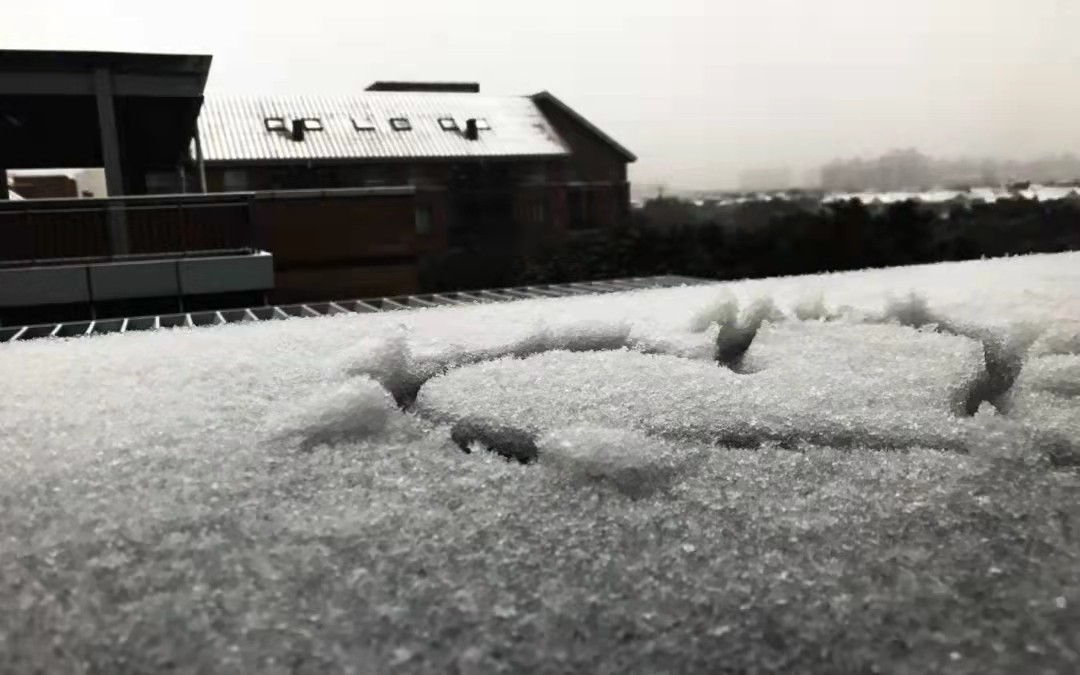
Photographed by Jackie, class of 2019
Last year's snow
Callista Y10
The fresh snow covering the ground melts again,
The icy blossoms bloom and the treetops wither again.
People are walking in the night on flowing fire,
The wine bottles in the corner fall one by one again.
And I spend the whole winter chasing
Last year’s melted snow.
There is frost on the car windows,
The pen in his hand is out of ink.
The sharp cold sings day and night,
"This, this is my season"
And I spend the whole winter discovering
Last year’s melted snow
In my heart, taking root and sprouting.
Brief comment by the Teacher Nina Chen:
The direct and colloquial language of this poem contains deep emotions. A sense of melancholy pervades throughout the poem, but not sorrow, and the emotions are layered and complex. The first stanza describes the dark night’s sense of loneliness and melancholy, with the repeated use “again” giving the sense of time passing slowly while setting a slightly sentimental tone. In the second stanza, the mood changes from melancholic to one that is nostalgic. The author seems to be reminiscing about something, using last year’s snowfall as a metaphor for something that is gone or has been lost. The ending of the poem has a strong feeling of vitality and the peaceful language strengthens the sense of nostalgia.

Photographed by Wilson, class of 2020
Winter
Susan Y10
Wandering the warm winter streets
Mottled light and shadow fall on
Green leaves and grey buildings’
small crevices
Illuminating the city and people's hopes
No icy cold wind beats my face
No bone-chilling chill penetrates my skin
No trembling passers-by
exhale misty white air
I want to sing in the sunshine
Sing of this wonderful encounter
I still so miss
that chilly winter
Perceptions of the author:
The inspiration for my poetry comes from the contrasting winters in Guangzhou and Shanghai. Winter in Shanghai is always gray and cold, but Guangzhou has a more temperate climate with warm sunshine all year round. Although Guangzhou’s weather is pleasant, when I am there, I somehow miss the cold winter, because in my mind winter should be chilly. Writing poetry for “Poetry for Winter” has allowed me to leave a permanent record of my conflicting emotions about and memories of winter.
Brief comment by the Teacher Rochelle Ding:
This poem imagines winter in a romantic manner, juxtaposing vivid imagery and the sensations of the weather’s coolness and the human body’s warmth. This poem seems to recall fond memories from the author’s past, brought to life in vivid poetic verse. We can say that the poem has a pleasant feeling of nostalgia that also brims with philosophical ruminations about our daily lives.
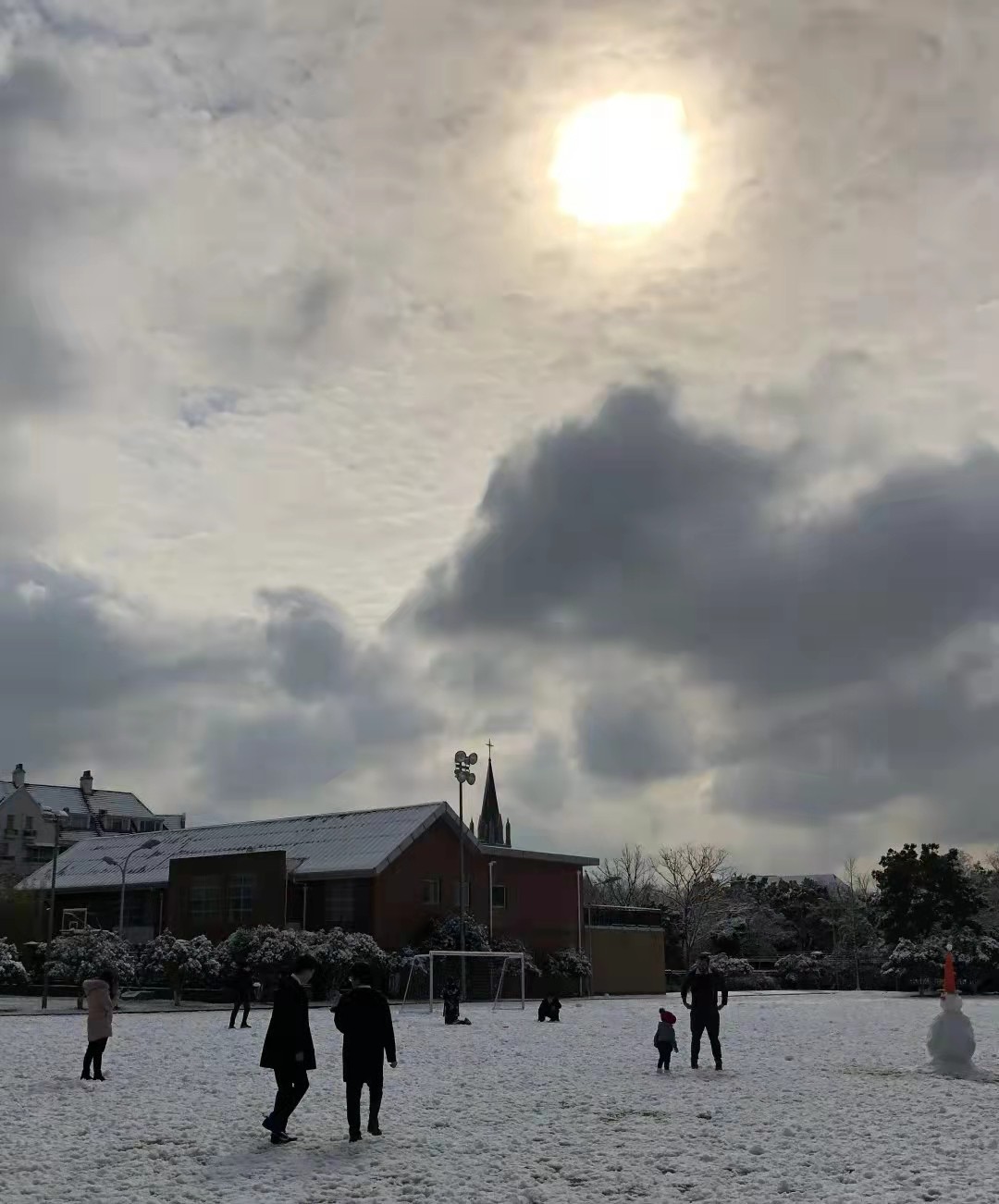
Photographed by Alex, class of 2021
Sacrifices of the Winter days
Isabel Y10
People always love to take a year of sadness and silence
Accumulated in a small box made of heartbeats
Under the first setting sun in early winter
And sacrifice it to the sky
The biting east wind caressed by the cloud's face
Just as the gods in heaven disdain mortal suffering
Threads of thoughts are rubbed into icy flowers
To fall randomly back to the ground
An old woman hurrying out of a wooden house
Dancing in the deserted snow
She grasps for memories in the wind made by longing
But blinded by tears
A group of children fleeing from the cold
Laughing and running in endless years
They are in the hall called "Childhood"
Stubbornly believe:
As long as they're running
The world will not be destroyed
The silver-white elf swirled and rose to the sky
A final homage to the end of winter
We spent the whole winter
Until the sunshine of early spring
With sacrifices full of tenderness and dreams
Perceptions of the author:
For me, "Winter" is a mosaic made up of countless fuzzy images. Winter seems to move especially quickly; in the blink of an eye, it slips away silently and leaves us with only fragmented memories. Each winter, we have snowball fights, build snowmen and feel “happy,” but the next winter we forget all about it. And so, we feel uneasy, both for ourselves and for this season that moves by so quickly that it barely gives us a chance to catch our breath. I was in this type of mindset when I wrote the poem.
I want to thank the Chinese teachers for providing me with an opportunity to express my ideas in poetic verse and explore the meaning of winter. May "Poetry for Winter" brighten up dreary winter days.
Brief comment by the Teacher Claire Weng:
This poem is notable for the author’s vivid and imaginative use of imagery, embodying a believable personal experience. The imagery, both realistic and imagined, brims with strong emotion that reflect the author’s feelings.
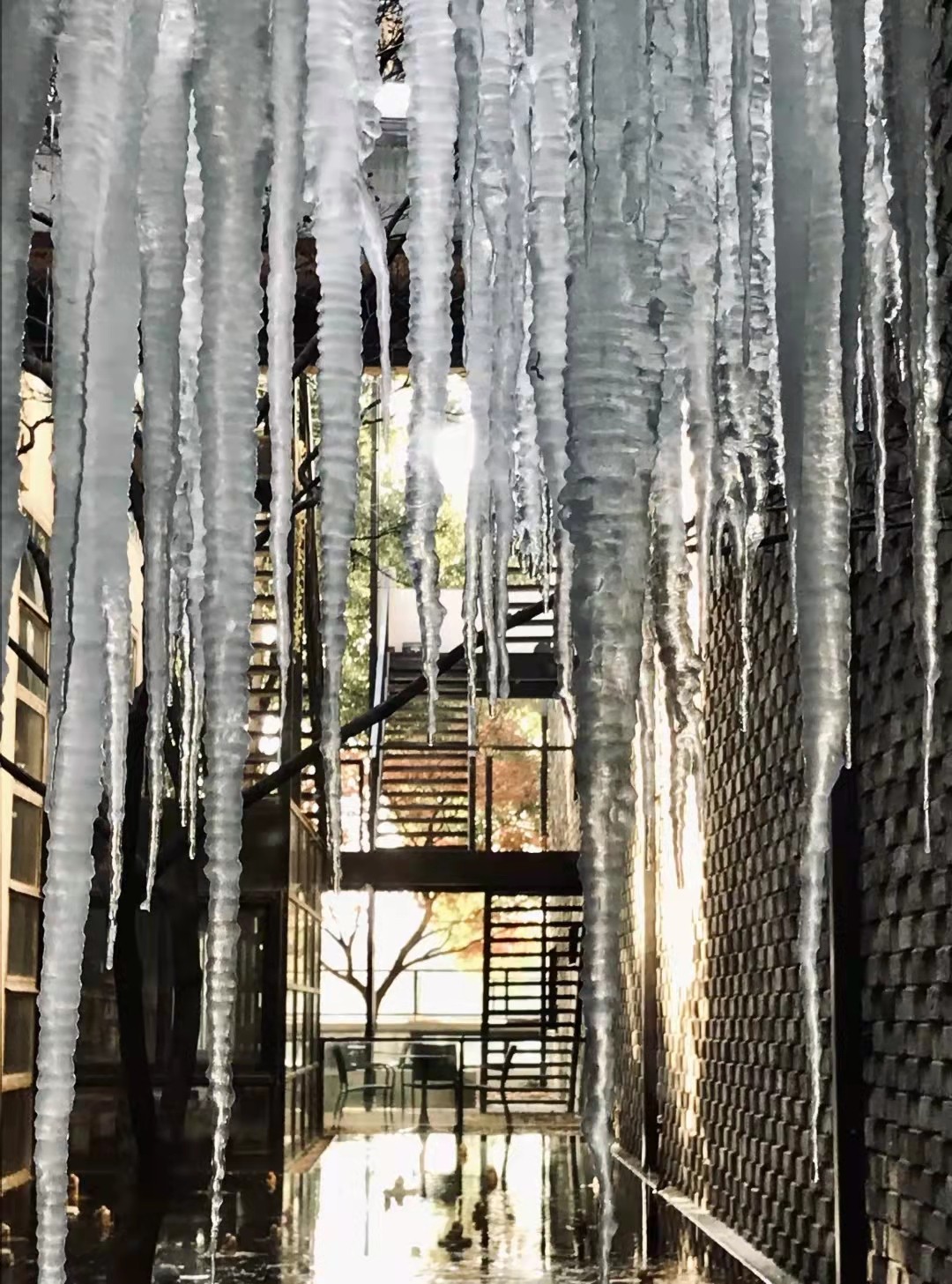
Photographed by Y12 Christine
Winter
Mary Y10
He is wearing a dark coat
Colour from dead leaves cold dyed onto the hems
Forced to move forward on an unending road
Withered,
It was he who carried the unwelcome
Icy cold,
He was the one who got kicked out the door
He himself brought
In the long night and in the warmthless sunlight
Remembering the lost light
Moving forward alone
Resolutely,
He throws his hands forward, no longer nostalgic
He knows that as long as the way back is no more
He can keep moving forward
The four seasons will continue turning
Brief comment by the Teacher Nina Chen:
The poem blossoms at its very end. There, the heretofore tripartite narration switches to freer expression, both the poem “Winter’s” self-expression and the implicit thinking of the author. The final line of the poem, “The four seasons will keep turning” provides a sense of time, giving the poetry a solemn and heavy feel. At the same time, the ending also shapes the spiritual world of "Winter”. It is a paradoxical situation of "continuously moving forward" but "continuously turning,” like a philosopher who has broken through bitterness and happiness. Here, the poem shows intellectual flair.
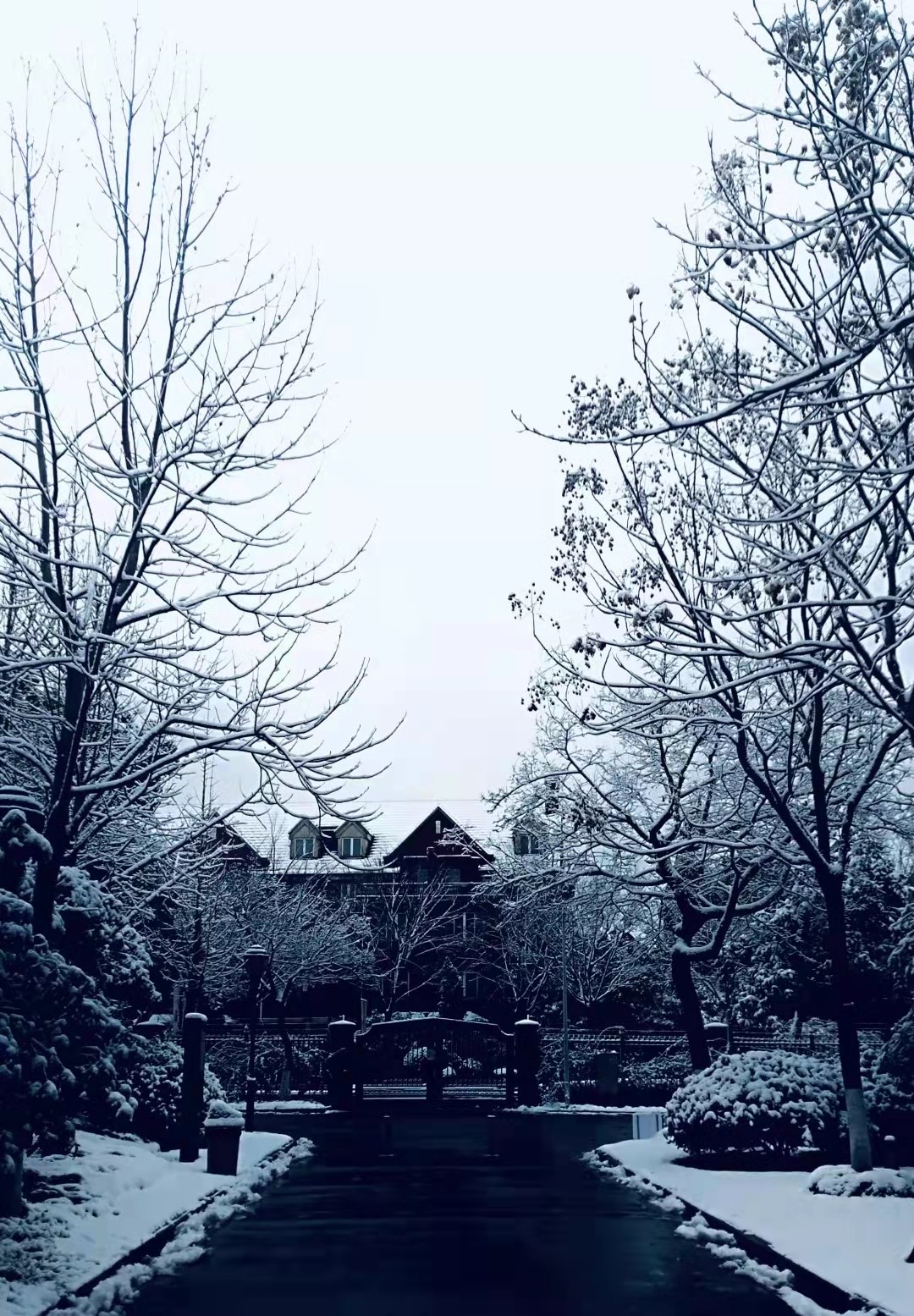
Photographed by Stella, class of 2019
A poem for winter
Vicky Y10
This center of the universe,
has a white planet.
The golden sun is locked in a glass house,
And it swirls and floats in the white air.
He reaches out and touches the glass,
The glass covered with feathered frost.
The black figures crawl
Tidy,
in unknown directions,
Scrambling in groups.
Winter is here,
Their sun is dead.
To escape from eternal loneliness,
towards the black hole.
She did not receive the sun he sent,
Orange light burned in the distance.
Waiting for the winter to be over,
She decided to set off to find him.
Maybe
She wishes
For a summer evening breeze
and winter sun
Brief comment by the Teacher Sandy Min:
Poetry can recreate the world imaginatively and achieve subtle and rich emotional tension. This poem depicts an alienated time and space, a paradox of cold and warm. It is both cold and silent, warm and hot, representing the details of the narrator’s life. This poem also features imagery of both groups and individuals—the group imagery elicits a strong sense of identity and blindness. The poem’s narrator is a lyricist, showing a good understanding of the subtleties of life and pursuing life’s ambitions with zeal.
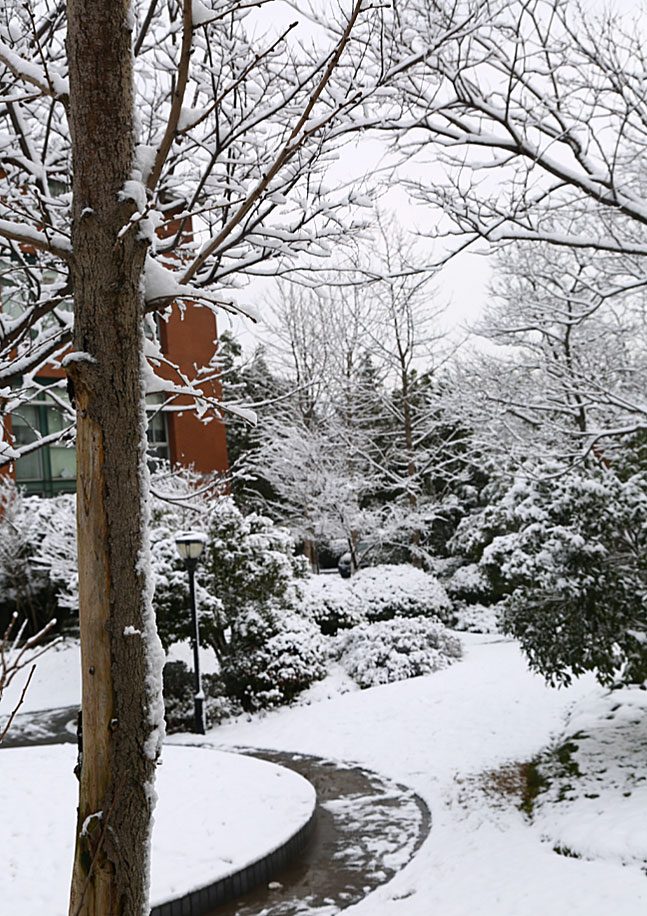
Photographed by Howard, class of 2020
Snow
Arthur Y10
Floating in the air, you watch people,
Afraid of the cold, people watch you by the fire.
Trembling makes you crystallise,
You have made a beautiful future.
Brief comment by the Teacher Zhao Dan:
Huang Shiyao’s “Snow” is similar to Bian Zhilin's classic poem "Broken Chapter", which is brief in its 34 34 words, yet rich in meaning. The difference is that the "you" in this poem has an obvious reference, and the author personifies the snow. It expresses the idea that humanity and nature’s destinies are intrinsically linked, and that one cannot be separated from the other. At the same time, those in the poem who fear cold and those who do not form a clear contrast – presenting two different outlooks on life. Obviously, the author chose to be "snow,” which seems to be a way of expressing their emotions through imagery.
We would like to express our gratitude to Yingyu Le (Head of High School Chinese), Nina Chen, Rochelle Ding, Sandy Min, Claire Weng, Zhao Dan, and Bella Lu for their guidance and the countless hours they put in to support the students’ creative process. Thanks to Bella Lu, the instructor of the "Reborn" club, as well as alumni Danny Guo and Aaron Lin, and all the club members for their input and dedication. Finally, we also would like to thank David Xiong, Director of High School Chinese Academics, for his guidance and support. He helped plant the seeds of the students’ interest in poetry, which now grows steadily and is blossoming.